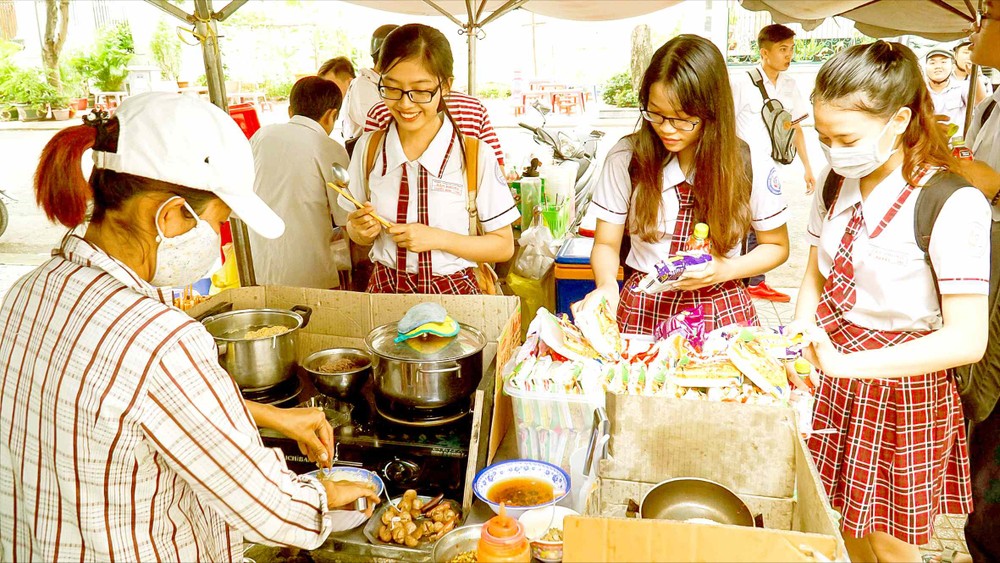
The heat of the summer is one of the major reasons why there is an uptick in food poisoning cases during these months. Therefore, processing and business establishments must take heed of food safety. Moreover, consumers must select clean food during the hot season when germs that cause foodborne illness can grow rapidly.
A week ago, Ms. Nguyen Phuong Thao Nguyen, 37 years old in Ho Chi Minh City’s Binh Thanh District, bought a box of stir-fried vermicelli for breakfast at a sidewalk street vendor on the way to the company. After eating stir-fried vermicelli, at noon, Ms. Nguyen began to show signs of stomach pain, vomiting, and dizziness. Her colleagues soon took her to a general clinic for emergency treatment where she was diagnosed with food poisoning. The doctor prescribed medication to aid digestion and instructed Ms. Nguyen to rest at home for 2 days.
Previously, on April 5, 37 students at Vinh Truong Primary School in Nha Trang City of the South-Central Province of Khanh Hoa had to go to the emergency room due to food poisoning after eating breakfast with many different dishes at shops outside the school and street vendors. Worse, one of them succumbed to the disease.
Recently, three people in a lion dance troupe in Binh Tan District also showed signs of food poisoning after eating sticky rice and fried chicken rice bought at eateries in the streets. Currently, two people have been discharged from the local hospital while one person is being intubated for breathing support at Trung Vuong Hospital.
According to Associate Professor Pham Khanh Phong Lan, Director of Ho Chi Minh City Department of Food Safety, the hot weather is conducive to bacteria growth. Potentially hazardous food needs to be kept at these temperatures to prevent food poisoning bacteria, which may be present in the food. In addition, due to prolonged hot weather, many people are afraid to cook, so they often buy unhygienic street food that is not stored properly resulting in possible food poisoning.
Meanwhile, car exhaust, cigarette smoke or other pollutants can also enter food to poison users due to not being stored properly. In addition, street vendors usually abuse chemicals and additives in food processing and preservation by improper food storage at the wrong temperature or improperly. Moreover, street vendors prepare food while receiving money from customers, or while preparing or serving food while smoking, laughing, talking, coughing, and sneezing without facemasks which is also one of the causes of food poisoning.
According to the Ministry of Health’s statistics, in the first quarter of 2024, some 16 food poisoning cases were reported nationwide down one case compared to the same period in 2023. Some 16 poisoning cases infected 659 people, an increase of nearly 3 times over the same period in 2023 including three deaths down 4 cases against the same period in 2023.
In March 2024 alone, there were six food poisoning cases nationwide, poisoning 368 people.
As a result, the Food Safety Department under the Ministry of Health has issued an official dispatch requesting health departments of provinces and cities to coordinate with relevant agencies to take preventative measures against food poisoning, especially from April to August. The Food Safety Department requires responsible agencies to strengthen inspection and supervision, especially on ready-made meal processing establishments, collective kitchens in industrial parks, schools and food service establishments, street food stalls, and bottled water companies.
The Department of Food Safety of Ho Chi Minh City also has a plan to implement the Month of Action for Food Safety from April 15 to May 15. Inspectors will pay visits to food production and processing businesses in the city. At the same time, the Department will increase information on food safety and improve people’s knowledge about food safety, and prevent food poisoning.
According to Associate Professor Pham Khanh Phong Lan, to avoid food poisoning in the hot season, people need to eat foods soon after they have been cooked so that harmful germs don't have time to grow. She advised people to discard any perishables left out at room temperature for more than two hours unless it is kept in a cold place. Store food at a safe temperature, in the refrigerator at a temperature of about 50C to prevent the growth of bacteria. Perishable fresh foods such as fish, meat, and seafood should be kept at a temperature of about 2-30 Celsius degree and frozen foods safely.
























